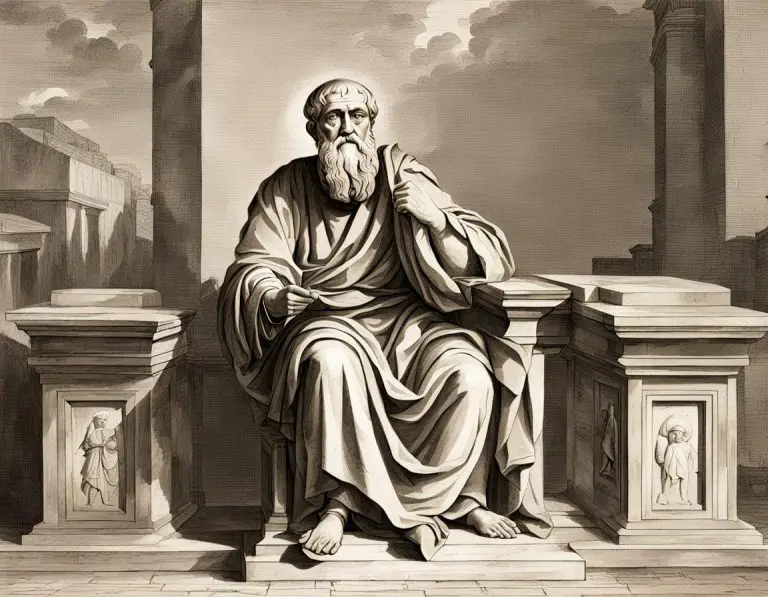Metaphor of the Sun
The Metaphor of the Sun, a foundational idea in Plato’s philosophy, symbolizes the nature of reality and knowledge. Plato likens the sun to the Form of the Good, the ultimate source of truth and understanding that illuminates the world of forms. Just as the sun enables visibility and clarity in the physical realm, the Form of the Good allows for illumination and comprehension in the realm of ideas. By shedding light on the essence of truth and virtue, the metaphor emphasizes the importance of seeking knowledge to move towards enlightenment and philosophical wisdom.
In Plato’s Allegory of the Cave, the sun is used as a metaphor for the highest form of reality, representing enlightenment and the ascent towards true knowledge. Those who are chained in the darkness of ignorance must turn their gaze towards the light of the sun, which symbolizes the journey towards wisdom and enlightenment. Through the metaphor of the sun, Plato highlights the transformative power of knowledge and the necessity of understanding the true nature of reality to attain philosophical enlightenment.
Symbolizing the Nature of Reality and Knowledge
The metaphor of the Sun, a pivotal concept in Plato’s philosophy, serves as a profound symbol of the nature of reality and knowledge. In “The Republic,” Plato uses the metaphor to illustrate the relationship between the physical world and the world of forms. Just as the sun is the source of light and visibility in the physical realm, the form of the Good is the ultimate source of truth and knowledge in the realm of forms. This metaphor highlights the idea that true knowledge is not derived from the material world but from understanding the eternal truths that underlie it.
By comparing the sun to the form of the Good, Plato emphasizes the importance of seeking knowledge beyond the shadows of mere appearances. The metaphor challenges us to look beyond the sensory world and instead focus on the realm of ideas and concepts. It suggests that true understanding comes from contemplating universal truths rather than relying on our limited perceptions. Through the metaphor of the Sun, Plato invites us to strive for a deeper comprehension of reality and to pursue knowledge that transcends the superficialities of the physical world.
Socratic Method
The Socratic Method is a cornerstone of Plato’s philosophical teachings, characterized by its dialectical approach to uncovering truth and knowledge. Instead of imposing his own beliefs on others, Socrates engaged in thought-provoking dialogues aimed at challenging assumptions and exploring the depths of various concepts. Through this method, Socrates encouraged individuals to question their own beliefs and engage in critical thinking to arrive at a deeper understanding of the world around them.
At the heart of the Socratic Method is the belief that wisdom begins with self-awareness and an acknowledgment of one’s ignorance. By admitting what one does not know, individuals open themselves up to a process of continual learning and growth. Through the method of persistent questioning, Socrates aimed to lead others on a journey of self-discovery, urging them to examine their values, beliefs, and actions with a critical eye.
Engaging in Dialogues for Truthseeking
Engaging in dialogues for truth-seeking is a central theme in Plato’s philosophy. Through his famous dialogues, such as “The Republic” and “The Symposium,” Plato presents engaging conversations between characters with differing viewpoints. This method of dialogue allows for the exploration of complex ideas and encourages readers to critically analyze different perspectives.
Plato believed that by engaging in dialectic conversations, individuals could uncover universal truths and gain a deeper understanding of the world around them. Through Socratic questioning and rigorous debate, Plato emphasized the importance of seeking knowledge and wisdom through dialogue rather than passive acceptance. This approach not only challenges individuals to think critically but also promotes a collaborative search for truth and knowledge.
Virtue Ethics
Plato’s philosophy places a strong emphasis on virtue ethics, highlighting the importance of moral character in guiding one’s actions and decisions. For Plato, virtue is not just about following a set of rules or principles, but it is about cultivating moral excellence within oneself. This idea suggests that true fulfillment and happiness come from living a virtuous life, where one’s actions are guided by wisdom, courage, temperance, and justice.
In Plato’s view, a virtuous person is someone who not only acts in morally upright ways but also possesses a deep understanding of what is truly good and just. This understanding goes beyond mere surface-level actions and delves into the core of one’s being, shaping their character and guiding them towards the ultimate goal of living a harmonious and virtuous life. Within the realm of virtue ethics, Plato’s philosophy offers profound insights into the nature of morality and the significance of cultivating virtuous qualities within oneself.
Emphasizing the Importance of Moral Character
Plato’s philosophy places a significant emphasis on the importance of moral character in shaping one’s life and society as a whole. According to Plato, the ultimate aim of human existence is to strive for moral excellence through the cultivation of virtues such as wisdom, courage, temperance, and justice. He believed that by actively developing these virtues, individuals could lead a harmonious and fulfilling life, contributing positively to the greater good of the community.
In Plato’s view, possessing a virtuous character not only enhances one’s own well-being but also has a ripple effect on the society at large. He argued that a just and virtuous individual would naturally create a just and harmonious society, echoing the sentiment that “an unexamined life is not worth living.” Plato’s stance on the significance of moral character serves as a timeless reminder for individuals to reflect on their actions, choices, and values, encouraging them to aspire towards the highest ideals of moral excellence for the betterment of themselves and the world around them.
Related Links
Reviewing Plato’s Theory of Forms: A Critical Analysis
The Historical Significance of Plato’s Philosopher King
